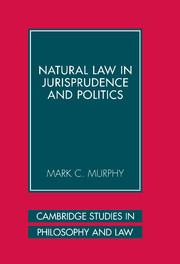Book contents
- Frontmatter
- Contents
- Acknowledgments
- Natural Law in Jurisprudence and Politics
- Introduction: Natural Law Jurisprudence and Natural Law Political Philosophy
- 1 Natural Law Jurisprudence Formulated
- 2 Natural Law Jurisprudence Defended
- 3 The Common Good
- 4 The Natural Law Rejection of Consent Theory
- 5 A Consent Theory of the Authority of Law
- 6 The Authority of Law and Legal Punishment
- 7 Beneath and Beyond the Common Good
- Works Cited
- Index
4 - The Natural Law Rejection of Consent Theory
Published online by Cambridge University Press: 10 March 2010
- Frontmatter
- Contents
- Acknowledgments
- Natural Law in Jurisprudence and Politics
- Introduction: Natural Law Jurisprudence and Natural Law Political Philosophy
- 1 Natural Law Jurisprudence Formulated
- 2 Natural Law Jurisprudence Defended
- 3 The Common Good
- 4 The Natural Law Rejection of Consent Theory
- 5 A Consent Theory of the Authority of Law
- 6 The Authority of Law and Legal Punishment
- 7 Beneath and Beyond the Common Good
- Works Cited
- Index
Summary
Consent and Natural Law Theories, Classical and Contemporary
There is a popular but false story concerning the connection between the rise of consent theories of political authority and the fall of natural law theories of political authority. The story is, to put it crudely, that the rise of consent theory in the modern period coincided with, and came as a result of, the fall of the natural law theory that dominated during the medieval period. Neat though it is, the story errs doubly, for it supposes both that consent did not play a key role in natural law theories of political authority offered in the medieval period (a supposition falsified by close inspection of the view of Aquinas, the paradigmatic natural law theorist; see Murphy 1997a) and that natural law theory did not play a key role in the consent theories of political authority offered in the modern period (a supposition falsified by close inspection of the views of Hobbes and Locke, perhaps paradigmatic consent theorists; for Hobbes as a natural law theorist, see, for example, Murphy 1995, and for Locke, see, for example, Tuckness 1999).
It is bad history to set up natural law and consent theories of political authority as unqualifiedly antagonistic to each other. But it is not an unfair description of the accounts of political authority offered by contemporary natural law theorists to say that these accounts were developed in self-conscious opposition to voluntaristic accounts of political obligation, and that their formulations rule out as normatively unnecessary a citizen's consent to adhere to the dictates of the civil law.
- Type
- Chapter
- Information
- Natural Law in Jurisprudence and Politics , pp. 91 - 111Publisher: Cambridge University PressPrint publication year: 2006

